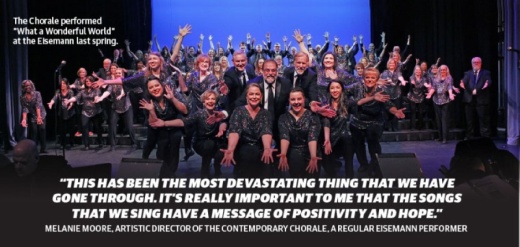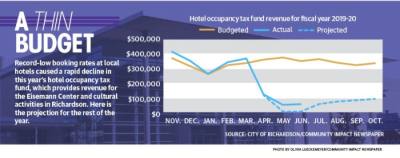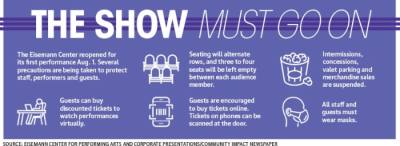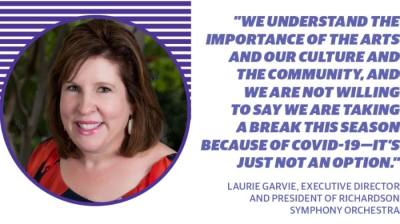The hotel industry was “immediately impacted” by the virus, Deputy City Manager Shanna Sims-Bradish said during a July 14 City Council briefing. Full-service hotels reported occupancy rates of 2.7% in April and 5.8% in May, she said.
“We started acting pretty much on March 13 trying to find ways that we could save some money in this fund,” she said. “It was a challenging environment, but we were able to make some quick decisions that put us in a better position.”
In Richardson, tax revenue from hotels is used in part to support cultural arts. Record-low occupancy rates meant there was little left in the way of funding for the Eisemann Center for Performing Arts and Corporate Presentations—the primary beneficiary of hotel tax collections.
“If the hotel industry is a little down, then obviously, that has an impact,” Eisemann Center Director Bruce MacPherson said. “We would certainly like to see heads in beds. That makes a big difference.”
After shuttering in March, the Eisemann reopened Aug. 1 but with strict occupancy and sanitation guidelines in place. One of the ways the city will offset the revenue loss is by suspending next year’s season of the Eisemann’s in-house productions, known as Eisemann Center Presents. Only the immensely popular Keyboard Conversations series will be held, MacPherson said. The facility will also be available for rentals.
Preliminary budget outlooks project a grim couple of years for tourism and the arts in Richardson. Despite this, members of both industries are finding new ways to attract business.
“We are seeking to reinvent ourselves,” said David Nethery, president of Arts Incubator of Richardson. “We are using the event of COVID[-19] as an opportunity to reevaluate who we are, why we are, what we want to do and how best to do that.”
Tourism link
In Richardson, there were 360 local events canceled between March 1-June 30, resulting in more than 50,000 lost hotel bookings, Sims-Bradish said during the council briefing.
“This is not going to be an easy recovery by any means,” Sims-Bradish said of the hit to the local economy.
Hotel tax revenue in fiscal year 2019-20 is projected to land at $2.3 million, which is $1.8 million, or 44%, below budget, Sims-Bradish said.
Drury Plaza Hotel in Richardson saw single-digit occupancy rates in March, April and May, said Heather Van Voorhis, the company’s director of sales. The property had opened just two weeks before government-ordered shutdowns went into effect.
Most travel in Richardson is business-related, Sims-Bradish said. The prevalence of remote employment and the cancellations of large-scale business gatherings translated to booking cancellations at the Drury throughout 2020, Van Voorhis said.
Summertime presented opportunities for the hotel to attract families looking to escape isolation. The Drury’s outdoor pool opened before Memorial Day weekend, and the lobby bar continued to operate at limited capacity. Occupancy rates gradually improved and are now in the 30%-50% range, Van Voorhis said.
“A lot of this is about going back to the sales basics of ‘Who is your traveler?’ and digging into some of those accounts that you wouldn’t have needed before,” she said.
The Drury has adjusted rates and offered promotions for groups to keep business afloat.
“When you open a hotel, you’re going to have some pretty attractive rates because you want to be competitive in your market,” Van Voorhis said. “But COVID[-19] really added a whole new layer.”
Innovation in the arts
The pandemic has left many artists strapped for cash. A recent survey conducted by nonprofit organization Americans for the Arts estimated a $9.1 billion hit to the industry nationwide. In Texas, the loss is estimated at $85 million, according to the survey.
The Richardson Symphony Orchestra and other groups like it receive the bulk of their funding from grants doled out by the city’s Cultural Arts Commission. One of the ways Richardson plans to curb revenue loss is by scaling back grants from the commission to $180,000 for the upcoming fiscal year. Last year’s budget set aside $375,000 for grants.
“We’ve done projections, and it’s going to be a very, very difficult year financially,” said Laurie Garvie, executive director and president of the orchestra.
The orchestra is planning to have its concert season as scheduled, Garvie said. Still, the setup will be much different than what audiences and performers are used to. For one, musicians will be spaced out on stage and separated by plexiglass dividers, Garvie said.
“We understand the importance of the arts and our culture and the community, and we are not willing to say we are taking a break this season because of COVID-19—it’s just not an option,” she said.
The fiscal ramifications of the virus have led many artists to lean into digital platforms as a way to cut costs and keep audiences engaged. The Contemporary Chorale has opted to go online for the fall, Artistic Director Melanie Moore said.
Virtual performances will be facilitated using My Chorale Coach, an online program with a built-in Zoom feature that allows voices to be synchronized from remote locations.
“This has been the most devastating thing we have gone through,” Moore said. “It’s really important to me that the songs we sing have a message of positivity and hope.”
Gov. Greg Abbott’s June 3 order restricts performance venue occupancy to 50%, which means the 1,600-seat Hill Performance Hall at the Eisemann Center will be able to accommodate only 250-350 in-person audience members, MacPherson said.
As a result, the Eisemann will offer livestreamed performances at a discounted price to those who cannot attend in person. Richardson Symphony Orchestra performances, for example, will have a virtual option.
“We are excited because even after COVID-19 has gone and people can do regular concerts at full capacity, ... there will still be a streaming need for the ability to get additional revenue,” MacPherson said.
The city is budgeting conservatively for revenue in light of these restrictions, Sims-Bradish said. Preliminary estimates project that revenue from the Eisemann will come in at $153,524 in fiscal year 2020-21, which is about $2 million less than the city was expecting before the pandemic hit.
“We honestly see that there probably is not going to be a lot of activity until we have a safe environment for performing arts to happen,” Sims-Bradish said.
City officials hope that the budget projections are wrong and that the city can incrementally restore funding to the Eisemann Center.
“We look at hotel fund revenue weekly, daily, to see how things are moving forward and what adjustments we need to do, and we will keep doing that,” she said.








